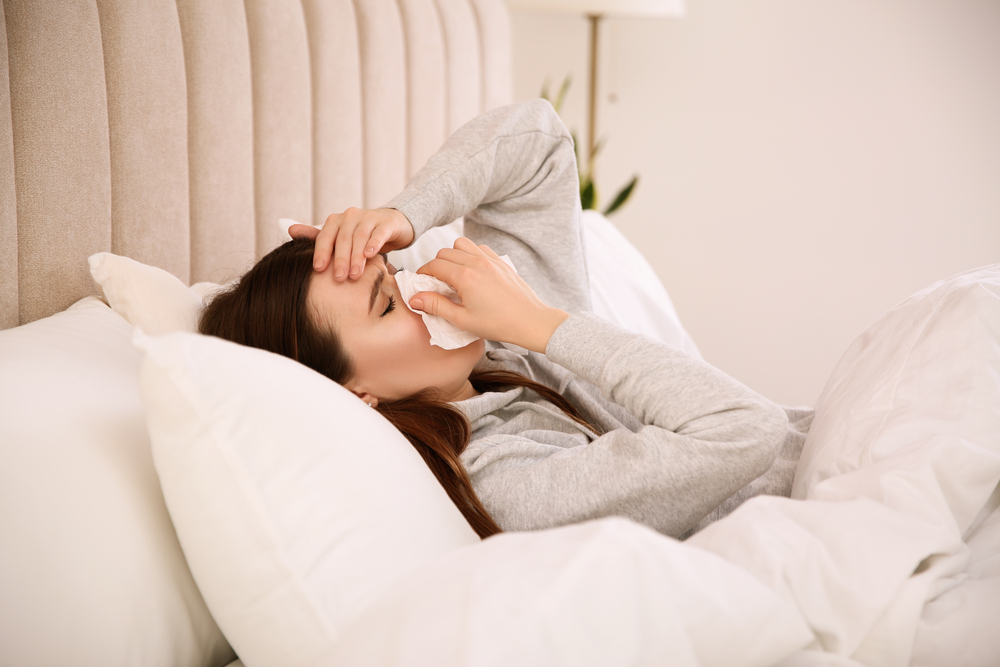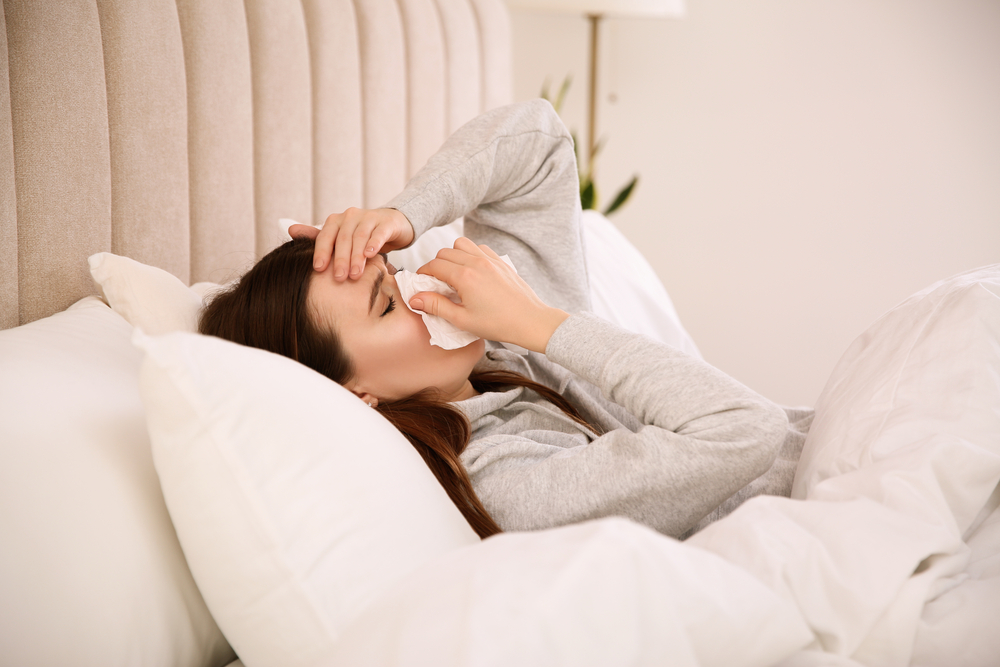Best Way to Sleep With a Stuffy Nose

The uncomfortable feeling of a stuffy nose might disrupt your daily activities and interfere with your sleep. While most cases of a blocked nose are relatively harmless and straightforward to treat, some may be a sign and symptom of a severe medical condition in need of immediate specialist treatment.
This definitive guide will describe everything you need to know about sleeping with a stuffy nose, including what causes nasal congestion, how to soothe your blocked sinuses and avoid sleep deprivation, and when to see your healthcare provider.
What Causes a Stuffy Nose?
Nasal congestion, also known as a stuffy nose, isn't just caused by the common cold or hay fever. It can be caused by several factors, including:
- Cold or dry air
- Obstructive sleep apnea
- Alcohol
- Respiratory infections such as the common cold
- Nasal obstructions
Poor air quality in your bedroom can also cause you to have a runny nose at night. Toxic allergens like dust mites and pet dander can be persistent where you rest, including under your bed, on your bed sheets, and your curtains.
The mucus in your nose plays a pivotal role in trapping these allergens. If the nasal passages become irritated, the inner tissues may become inflamed, producing more mucus than usual. The excess mucus might build up in your nose, making it feel stuffy.
Why Does My Stuffy Nose Worsen at Night?
A blocked nose can affect you at any time of the day. However, it often gets worse at night.
This is because when you lie down, blood flows to the nasal passages, which causes swelling and obstruction. This nasal congestion can flow up into the upper airways, making it difficult to breathe through the nose.
Acid reflux can also cause nighttime stuffiness. When lying down at night, stomach acid can flow into your throat and nasal cavities, causing irritation and congestion.
It's worth noting that nasal congestion runs on a circadian rhythm (a 24-hour biological clock). It worsens at night and early in the morning, so you might feel more of a stuffy noise during these times.
Your condition might also worsen during the night when you sleep if you're allergic to something in the bedroom, like pet dander or dust mites. Some plant species also release pollen during the night, which can trigger nasal irritation and allergic reactions.
Tips on How to Sleep with a Stuffy Nose
While a runny nose can make it quite hard to fall asleep, there are simple things you can do to help ease your nasal congestion.
Below, we'll discuss these strategies in great detail.
Drink Calming Tea

Drinking herbal teas before bed is a perfect way to deal with a stuffy nose at night. Due to their sleep-inducing and anxiety-reducing antioxidants, varieties like chamomile tea are highly beneficial for reducing late-night stress and preparing you for a good night's sleep. Just make sure you avoid taking anything caffeinated.
Wear Nasal Strips
Nasal strips are designed to increase nasal airflow, making them great remedies for stuffy noses at night. And since they're a drug-free alternative, they come without the adverse side effects common with most over-the-counter medicines. You can get nasal strips online or pick them up at any pharmacy.
Take a Hot Shower
A hot shower before bed can help alleviate your sinus congestion by loosening the mucus in your nose, allowing it to drain.
If you have the time to bathe before bed, hop in the shower, set your water to be hot, and close your bathroom door to allow steam to gather. Once your bathroom is thoroughly steamed up, take deep breaths to help clear your nose.
Do a Facial Steam
If you don't want to get wet, consider doing a facial steam. Hold your head over a basin or bowl of hot water and inhale the steam. Placing a towel over your head will keep the steam from escaping.
Consider adding a few drops of essential oils, such as peppermint and eucalyptus, to the hot water to increase the steam's effectiveness.
Invest in an Air Filter
Using an air filter can help lessen the symptoms of individuals with allergies and asthma. And if you have a stuffy nose, trying out a filter may also help with your symptoms.
If you already have an air filter, ensure it's clean before you start using it. Dirty air filters can negatively impact the air quality in your room, which can be highly bothersome for those with a runny nose.
Run Your Humidifier
Aside from adjusting humidity levels during the daytime, you'll especially want to keep off dry air at night. Keeping nasal passages moist is a vital factor when treating a blocked nose. It helps empty the fluids in your nose, allowing you to breathe smoothly.
When running your humidifier, ensure you stay within a healthy humidity range of 40% - 50% and only use purified water. If you're using an air filter, you might also want to run your humidifier simultaneously, as air filters tend to dry out living spaces.
Ensure you clean your humidifier regularly, as moisture can encourage the growth of fungi and bacteria.
Keep Pets Out of the Bedroom
Although cuddling your cat or dog is a relaxing way of falling asleep, it's not doing your stuffy nose any favors. So, consider keeping your pets out of your bedroom and invest in dust-proof covers for your comforters and pillows.
Use a Nasal Decongestant

Nasal decongestants can help ease congestion due to infections and allergies. They're great remedies for short-term use and can deliver rapid relief.
However, it's worth noting that some decongestants contain substances that can cause tolerance. This can, in turn, lead to rebound congestion if you use the nasal spray for a long period and then try to stop.
That said, always go through and follow the instructions written on the packaging, including the number of days in a row that you can use decongestant nasal sprays.
Stay Hydrated
Keeping your body hydrated with enough water can help thin mucus in your nose and drain it to relieve congestion. Women should drink about 2.7 liters of water daily, while men should take at least 3.7 liters per day.
You can also take plenty of water-rich vegetables and fruits to keep you hydrated. This includes lettuce, strawberries, cucumbers, and peaches. However, be careful not to take too much water before bed, as you may end up waking up frequently at night to use the bathroom.
You should also avoid alcoholic or caffeinated drinks before bed. Caffeine has a stimulant effect that can keep you awake at night, while alcohol can make your congestion worse, as we'll discuss further below.
Gargle with Salt Water
Gargling with salt water might offer some relief for a stuffy nose and sore throat. In addition to preventing upper respiratory infections, the salty solution fights bacteria, which helps loosen the mucus in your nose just in time for bed.
All you need to make this solution is half a teaspoon of salt and a glass of warm water. Stir the mixture, then take small sips of the solution and gargle them for a few seconds before spitting them out.
Use Essential Oils
Interested in natural remedies? Using essential oils might be the perfect way to go. Some of the effective ways of using these oils include:
- Taking a bath with them right before bedtime
- Putting them in a diffuser
- Adding them to your pillow
- Applying them directly on your skin (make sure you mix them with a carrier oil first)
- Smelling them
While more research is still needed to confirm the connection between these oils and nasal congestion relief, various studies have shown that peppermint, chamomile, and eucalyptus oil may have medicinal properties that can help minimize cold symptoms.
Try Acupressure
Acupressure involves applying force on a specific part of the body. In this case, you want to activate pressure points at the sides of your nostril to ease sinus discomfort.
Hold your right and left index fingers in place for about 3 minutes. This simple remedy will relieve the congestion in the nose, helping you feel less stuffed up before bedtime. If your blocked nose persists, repeat the procedure to release pressure in your sinuses.
Apply a Vapor Rub
Applying a vapor rub to your chest and neck can minimize cold symptoms and improve your overall sleep quality. This method could offer immediate, short-term relief, making it an ideal remedy to try right before going to bed. Most vapor rubs have eucalyptus oil, which, when combined with menthol, can make it much easier to breathe while sleeping.
Use a Saline Spray (Nasal Irrigation)
The saline solution works by minimizing inflammation and hydrating the nasal passages. While it won't fix your sinuses completely, saline nasal spray can loosen the pressure enough to help you fall asleep.
You can buy a bottle of saline spray or make the solution in the comfort of your home using a spray bottle, salt, and water. Apply 2 squirts of the solution into your nostrils 5 times daily to ease sinus discomfort and clear your nose out.
Avoid Drinking Alcohol Before Bed
While alcohol can make you feel drowsy, it messes with your sleep by:
- Fragmenting your sleep
- Suppressing REM
- Increasing your odds of snoring
What's more, it can cause congestion by dilating blood vessels in the nose. Generally, reducing how much you drink can help relieve your blocked nose, and avoiding it at night can prevent it from disrupting your sleep, if you've already got a stuffy nose to deal with.
Eat Spicy Food
Spicy foods contain capsaicin, which can help thin mucus in your nose, making it easier for you to breathe. It can also increase mucus, helping get your nose running and flushing out congestion.
Keep in mind that spicy meals are not recommended to patients treating any symptoms caused by acid reflux because they can worsen the condition.
Prop Yourself Up with Pillows
Elevating your head before bed increases drainage and decreases nasal congestion. That's why the best sleep position for individuals with a stuffy nose is back sleeping with different pillows elevating the head and neck region.
Choosing the right pillow size that makes you feel comfortable will also help you breathe better all night long. Just ensure you keep your pillows clean by washing them regularly to remove dust mites.
Try Medications
Over-the-counter drugs can help ease your symptoms before bedtime. Antihistamines, for instance, will relieve allergy symptoms, including sneezing and congestion.
Decongestants can also help soothe stuffed sinuses and offer relief if you have a cold. Remember to read the medication label before opening it, stick to all dosage instructions, and take the drugs at the recommended intervals.
When to See Your Doctor

Generally, a stuffy nose isn't cause for alarm. It's often caused by temporary bouts of the flu and common cold or seasonal allergies.
While most individuals can easily treat a mild case of stuffy nose in the comfort of their homes, certain groups of people should see their physician for diagnosis. This includes individuals with a compromised immune system, infants, and adults aged 65 and older.
You should also book an appointment with your doctor if you experience:
- Bloody or pus-like nasal discharge
- Yellow or green nasal discharge
- High fever
- Difficulty breathing
Even if you don't fall into any of the categories mentioned above, consider seeing your doctor if your symptoms get progressively worse or last for over a week.
Closing Thoughts
Having a stuffy nose at night can make it difficult to fall asleep and stay asleep, but many home remedies can offer relief. Following the tips mentioned above will put you on the right track to sinus pain and nasal congestion relief and improve your sleep quality in general.
However, if symptoms persist or get worse, your best bet will be to consult your doctor. You may be suffering from a sinus infection that needs more aggressive treatment.

